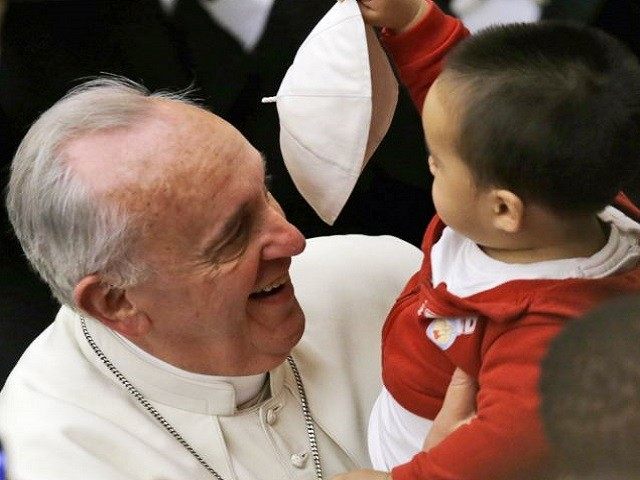After last Wednesday’s smackdown on absentee fathers, this week, Pope Francis weighed the positive qualities of good fathers, even their willingness to punish their children when needed.
In his address at his weekly General Audience Wednesday, Francis reiterated that “every family needs a father” and that fathers should aspire to be both firm and gentle.
Like the father in the parable of the Prodigal Son, Francis said, “a good father knows how to wait, and knows how to forgive from the bottom of his heart.”
“Of course, he also knows how to correct firmly,” the Pope said. “He is not weak, yielding or sentimental. The father who knows how to correct without humiliating is the same one that knows how to protect unsparingly.”
Pope Francis shared with the audience of 7,000 a conversation he had with a father, who had admitted to him that he would sometimes hit his children when they misbehaved.
Smiling and mimicking the action of spanking a child on the bottom, the Pope said, “At a couples meeting, I once heard a dad say, ‘I sometimes have to smack my kids a little, but never in the face so as not to humiliate them.’ This is good! He has a sense of dignity. He has to punish, he does it in the right way, and he moves on,” he said.
Not everyone agreed with the Pope’s comments, and campaigners were quick to express their consternation.
Peter Saunders, the founder of the National Association for People Abused in Childhood, called the Pope’s words “very misguided.”
“It is disappointing that anyone with that sort of influence would make such a comment,” said Peter Newell, the coordinator of the Global Alliance to End Corporal Punishment of Children.
In his address, Francis said that above all, fathers should aspire to raise wise and righteous children. A good father, the Pope said, is not worried about his kids growing up just like him and following in his footsteps. He does not say, “I’m proud of you because you’re just like me, and because you repeat the things I say and do.”
Quoting the Book of Proverbs, Francis spoke of what a good father is looking for in his children. “My child, if your heart is wise, my heart too will be glad. My soul will rejoice when your lips speak what is right.” This is what really matters in life, the Pope said, “a wise heart.”
Speaking in the place of fathers regarding their legacy to their children, Francis said:
I will be happy every time I see you act wisely, and I will be moved every time I hear you speak righteousness. This is what I wanted to leave to you, that it might become yours: the ability to feel and act, speak and judge with wisdom and righteousness. And so that you could be like that, I taught you things you did not know, I corrected mistakes that you did not see. I made you feel a deep yet discreet affection, which perhaps you didn’t fully recognize when you were young and uncertain. I have given you a witness of rigor and firmness that maybe you did not understand, when you wanted only complicity and protection. I had to put my own wisdom of heart to the test first, watching out for an excess of sentiment and resentment, to bear the weight of inevitable misunderstandings and find the right words to make myself understood. Now when I see that you strive to be like this with your children, and with everyone, I am moved. I am happy to be your father.
“This is what a wise father, a mature father says,” he concluded.
“A father knows what it costs to pass on this legacy: how much nearness, gentleness and firmness are needed,” Francis said. “But what a consolation and what a reward you receive, when your children are a credit to this legacy! It is a joy that compensates all the labor, surpasses all misunderstanding and heals all wounds,” he said.
Francis said that the most important thing is for fathers to be present in the family, close to his wife and close to his children, without being overbearing or controlling.
“He needs to be there for his children as they are growing up,” Francis said, “when they are playing and when they are working, when they are carefree and when they are distressed, when they express themselves and when they are silent, when they dare, and when they are afraid, when they mess up and when they find their way. The father should always be there!” he said.
Follow Thomas D. Williams on Twitter @tdwilliamsrome.

COMMENTS
Please let us know if you're having issues with commenting.